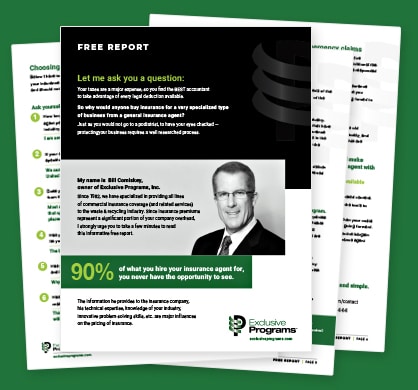Understanding the ins and outs of Florida worker’s compensation verification is crucial for any business owner, particularly those in the waste and recycling industry. As operators of fleets ranging from 5 to 10 vehicles, maintaining a favorable loss ratio is essential to managing costs effectively. This guide provides a comprehensive look at what Florida worker’s compensation covers and, importantly, what it does not cover.
The Importance of Workers Compensation Verification in Florida
Workers compensation insurance is a mandatory requirement for businesses in Florida, providing vital protection for employees in case of work-related injuries or illnesses. Florida worker’s compensation verification ensures that your business is compliant with state laws, which is particularly important for those in high-risk industries like garbage collection. Verifying your worker’s comp coverage not only helps in adhering to legal standards but also secures the financial stability of your business by safeguarding against potential claims and litigation.
What is Workers Compensation Insurance?
Workers compensation insurance is designed to cover medical expenses, rehabilitation costs, and lost wages for employees who get injured on the job. For businesses in the waste and recycling sectors, where the risk of physical injury is higher than in many other industries, having robust workers comp coverage is not just a regulatory requirement but a critical component of risk management.
What is Not Covered by Workers Compensation Insurance?
While worker’s compensation insurance is expansive, there are limitations to what it covers. Understanding these exclusions is key to managing your risk effectively.
Common Exclusions in Workers Compensation
- Intentional Acts: Any injuries caused by an employee’s intentional actions to harm themselves or others are not covered.
- Owner and Executive Injuries: Owners and executives of a company might not be covered under the standard worker’s comp policy unless they opt-in.
- Injuries Incurred Outside of Work: Injuries that occur during an employee’s personal time and not during work operations are typically not covered.
- Stress and Mental Injuries Without Physical Harm: While some states are beginning to recognize these claims, Florida typically requires physical injury for a claim to be compensable.
Understanding these exclusions is particularly relevant for businesses in the garbage collection industry, where the physical demands of the job can often blur the lines between work-related and non-work-related injuries.
Strategies for Maintaining Effective Workers Compensation Coverage
Maintaining effective workers’ compensation coverage is not just about compliance; it’s about optimizing protection and cost-efficiency for your business. Here are several strategies that garbage collection and recycling companies can adopt to maintain robust coverage:
Regular Policy Reviews and Updates
Business owners must conduct regular policy reviews for Florida Workers Compensation Verification. This ensures that the coverage remains adequate as the business evolves and changes. For instance, if your fleet size increases or you venture into new types of waste management services, your insurance needs may change.
- Schedule Annual Reviews: Engage with your insurance agent to review your policies annually. This helps to adjust coverage based on new risks or changes in business operations.
- Employee Training Programs: Implement regular training for employees on safety protocols. Well-trained employees are less likely to suffer workplace injuries, potentially lowering your insurance premiums due to reduced claim risks.
Leveraging Technology for Risk Management
Technology can play a significant role in managing workers’ compensation risks. For example, telematics in vehicles can monitor driver behavior, helping to reduce accidents and related claims.
- Invest in Safety Technologies: Incorporate equipment like vehicle cameras and automated lifting mechanisms to reduce the physical strain on workers, thus minimizing the risk of injuries.
- Use Data Analytics: Analyze accident and claim data to identify common trends and develop targeted prevention strategies. This data-driven approach can help in fine-tuning your risk management practices.
Conducting Florida Worker’s Compensation Verification
Florida workers compensation verification can require businesses to use several resources:
- Florida Division of Workers’ Compensation: This state-run entity provides tools and resources for businesses to verify coverage and compliance.
- Third-Party Verification Services: These services can provide detailed reports and help streamline compliance checks, especially useful for businesses with multiple coverage policies across different states.
Verifying Your Coverage
Ensuring your business’s coverage is up to date involves regular checks and balances:
- Regularly review your policy details to ensure all information is current and accurate.
- Maintain open communication with your insurance provider to quickly address any discrepancies.
- Use state-provided tools to perform routine checks and avoid any lapses in coverage.
Why Verification Matters for Waste and Recycling Businesses
For companies in the waste and recycling industry, the importance of Florida Workers Compensation Verification cannot be overstated. Regular verification helps manage risks effectively, ensuring that both the business and its employees are protected against unforeseen incidents. This is particularly critical given the physically demanding nature of waste and recycling operations and the potential high costs associated with workplace injuries.
For businesses in the waste and recycling industry, regular Florida worker’s compensation verification is not just about compliance—it’s a strategic component of effective risk management. Knowing what is and isn’t covered by workers’ compensation insurance can significantly impact how you manage business risks and liabilities.
If you’re looking to ensure that your coverage meets all your business needs while staying compliant with Florida laws, don’t hesitate to reach out for professional assistance. Contact us for more information on how we can help you manage your worker’s compensation requirements more effectively, ensuring you’re covered where it counts.


